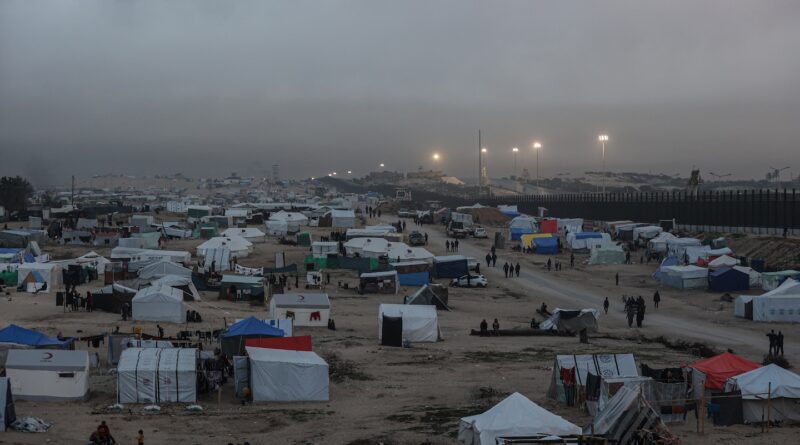Analysis | As Israel corners Rafah, Netanyahu defies the world
In a Wednesday phone call with Israeli Prime Minister Benjamin Netanyahu, French President Emmanuel Macron said Israel risked a “humanitarian disaster of a new magnitude.” A joint statement from the leaders of Australia, Canada and New Zealand said “a military operation into Rafah would be catastrophic” and called on Israel to “listen to its friends.” The prime ministers of Spain and Ireland wrote to authorities in Brussels, suggesting Israel may be in breach of its association agreement with the European Union and demanding an “urgent review.”
U.N. officials said the likelihood of flagrant violations of international law and potential war crimes was mounting in a conflict that has already seen more than 27,000 Palestinians killed — the majority women and children — and a large chunk of Gaza’s civilian infrastructure destroyed. “The risk of commission of atrocity crimes should a full military incursion into Rafah take place, is serious, real and high,” Alice Wairimu Nderitu, U.N. special adviser on the prevention of genocide, said in a statement.
Martin Griffiths, the U.N.’s top humanitarian official, said the prospect of an Israeli ground offensive placed his organization’s relief operations at “death’s door” and could lead to a massacre of civilians. “The international community has been warning against the dangerous consequences of any ground invasion in Rafah,” he added. “The Government of Israel cannot continue to ignore these calls. History will not be kind.”
Though more circumspect in its public messaging, the White House is also disconcerted. It wants Israel to carry out only targeted operations against Hamas in the city. As my colleagues noted, President Biden has said his administration will not support a full-scale assault on Rafah without “a credible plan” from Israel to evacuate Palestinian civilians in harm’s way. Such a concrete plan, at present, does not exist: Talk of “safe zones” along the beach in an area known as al Mawasi has proven mostly notional, with civilians squatting in squalid conditions without reliable access to shelter or food.
Egypt, for its part, has fortified its border with Gaza and does not want to see a million Palestinian refugees pouring over it — out of its own security concerns, but also due to long-standing Arab fears that this would facilitate the de facto ethnic cleansing of Gaza by Israel. Still, as my colleagues reported Thursday, satellite imagery shows that Egypt has cleared and put up a concrete wall around a large plot of land along the border. This may be the site of a potential refugee camp.
“If as a result of the attacks [in Rafah] tens of thousands of Palestinians cross the border, do you think the Egyptian army would shoot at them? The answer is no,” a former Egyptian official told my colleagues. “Any responsible government would have to think, ‘Okay, if we have the worst-case scenario, how would we deal with that?’”
U.S., Arab and Israeli interlocutors are still wrangling over a potential agreement with Hamas that could see at least a pause in the fighting and the release of Israeli hostages still in Hamas captivity. Netanyahu waved away the prospect of a diplomatic breakthrough, saying Hamas’s demands were “delusional” and vowing to obliterate the militant group.
“We will fight until complete victory, and this includes a powerful action also in Rafah after we allow the civilian population to leave the battle zones,” Netanyahu said Wednesday. There’s speculation, my colleagues reported, “that Netanyahu’s threats against Rafah are a diplomatic feint, aimed at pressuring Hamas to accept a deal.” The Tuesday departure of Israel’s negotiation team from talks in Cairo provoked the anger of families of hostages within Israel; small protests against Netanyahu and his war cabinet took place through the week.
The Israeli prime minister has also frustrated the White House with his refusal to grapple with serious discussions about a postwar scenario. The Biden administration, with the tacit support of a number of influential Arab governments, envisions a grand bargain that would provide for both the reconstruction of Gaza, the revival of a political track for Palestinian statehood and Israel’s deeper integration into the region.
“The elephant in the planning room is Israel, and whether its government will acquiesce to much of what is being discussed: the withdrawal of many, if not all, settler communities on the West Bank; a Palestinian capital in East Jerusalem; the reconstruction of Gaza; and security and governance arrangements for a combined West Bank and Gaza,” my colleagues reported Wednesday. “The hope is that Israel would also be offered specific security guarantees and normalization with Saudi Arabia and other Arab states that would be hard to refuse.”
But Netanyahu’s office responded the next day, dismissing any talk of such an agreement. Netanyahu has long opposed the emergence of a sovereign Palestinian state alongside Israel. “Here is Israel, we’re still in the aftermath of the October 7th massacre,” Avi Hyman, a spokesman for Netanyahu’s office, told Israeli newspaper Haaretz. “Now is the time for victory — total victory against Hamas. And we will continue on the path to victory. All discussions about the day after Hamas will be had the day after Hamas.”
Serious analysts, including a member of Netanyahu’s own war cabinet, believe Israel will never be able to fully eradicate Hamas. But it is inflicting untold harm on civilians and has provoked a humanitarian crisis unprecedented in its combined scale and speed. Critics also lay the blame at the foot of a Biden administration that is unwilling to use what leverage it has to rein in Netanyahu.
“America’s pressure on Israel must go beyond stern words and leaked angry conversations,” wrote Michael Hanna of the International Crisis Group. “The U.S. today is complicit in the destruction of Gazan society, the immiseration of much of the strip. But even at this late stage there are choices to be made and further catastrophe to be avoided.”




